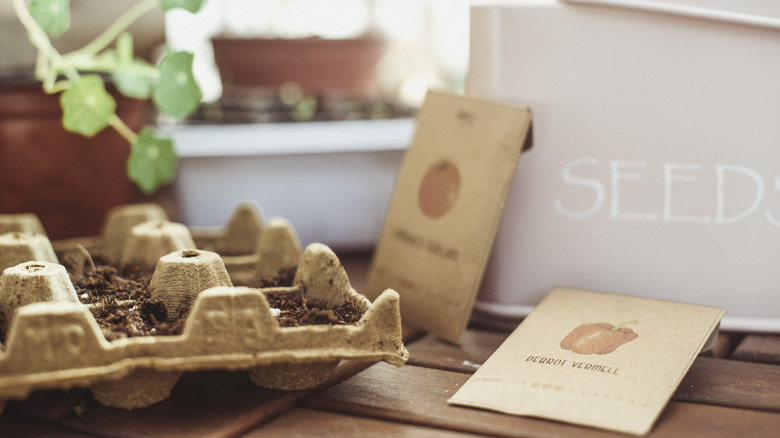Do Non-GMO Labels On Seed Packets Really Matter To The Home Gardener?
Long before you can enjoy the fruits (or flowers, or veggies) of your labor in the garden, you have to buy your garden seeds. Seed packets come with a dizzying range of labels and descriptions that can be confusing for shoppers to sort through. One of those labels is "non-GMO." Despite its prevalence, this label isn't very useful to the home gardener, but there's a chance it could be more important in the future.
GMO stands for genetically modified organism. It refers to plants that have been altered by adding or removing genes, rather than traditional breeding. In the U.S., there are only a few GMO crops in production; they include many used in large-scale farming, such as soybeans, cotton, and corn. They've been modified to resist certain pests and diseases, or in some cases to resist herbicides to make weed control easier.
For as long as GMO crops have existed, there have been controversies surrounding them. The potential environmental implications are not well-known, and though there's no evidence that the altered genes in GMO crops could lead to cancer or cause allergic reactions, those fears remain common. The Food and Drug Administration says that GMO foods are "carefully studied before they are sold to the public to ensure they are as safe as the foods we currently eat." Still, these fears have led to increased vigilance around labels, as buyers want to know for sure which foods and seeds are GMOs. But for home gardeners, GMO seeds are mostly a non-issue since they're not widely available — with a couple of noteworthy exceptions.
The truth about GMO seeds
Unless you're a commercial farmer, you'd have a hard time getting your hands on GMO seeds. These are patented crops that are not sold at regular gardening stores. Nonetheless, non-GMO labels remain common on seed packets, with many companies signing the Safe Seed Pledge not to grow GMOs or undergoing third-party verification that their seeds have not been genetically modified. These labels appeal to cautious buyers, and they can increase sales. Most gardening seeds would never have been genetically modified anyway, so just missing the words "non-GMO" doesn't mean much.
However, a few GMO seeds have found their way onto the home gardening market. As of 2024, you can grow genetically modified tomatoes in your garden, GMO orange petunias, or petunias that glow in the dark. The tomatoes are purple inside and out, a feat that normal plant breeding can't achieve. And unlike glow-in-the-dark petunias, the average gardener might not know that purple tomatoes don't typically exist in nature. According to NPR, similar purple tomatoes were mistakenly sold by Baker Creek Heirloom Seeds as an heirloom variety, leading to a recall after the company couldn't verify that they weren't genetically modified.
While still outliers, these cases point to the possibility that non-GMO labels could matter more for gardeners in the future. If GMO seeds become more common, buyers will want to know exactly where to find (or avoid) them. Even then, labels are only as useful as the tests that support them, as the Baker Creek controversy shows. Unless non-GMO becomes a standardized certification, as with organic and non-organic seeds, the usefulness of the label could remain in question.

